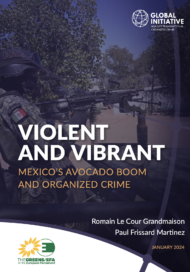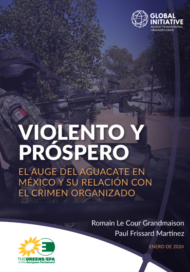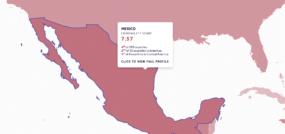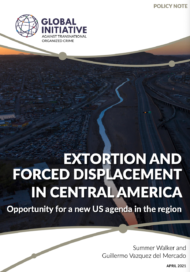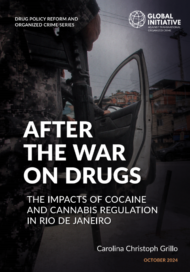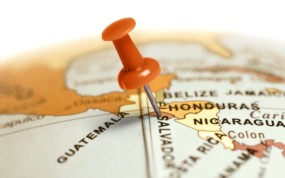The contemporary boom of global avocado consumption has drawn attention to Mexico’s industry and the expanding criminal networks that surround it. In fact, avocado production and exports – both to the United States and the European Union − display worrying signs of criminal organizations being involved in the market, human rights violations, and environmental and health impacts.
Yet, contrary to studies that have tended to present organized crime as a barrier to business, our policy report shows that the industry has grown despite, or parallel to, rising levels of violence and criminal networks.
Focusing on the state of Michoacán, the world’s n°1 producer of avocado, “Violent and vibrant” shows how international demand and organized crime groups have shaped a multi-billion-dollar industry in which politico-criminal relations continue to play a crucial role.
While the European Union and Mexico are in the final rounds of negotiations towards the “modernization” of the EU-Mexico Trade Agreement (Global Agreement) our objective is to understand the dynamics of violence that accompanied the avocado boom, including organized crime activities, human rights violations, environmental crime and harm, and the potential impact of further liberalizing trade between Mexico and the EU.
Over the past decades, the Mexican avocado market’s exponential growth has been accompanied by rising levels of violence. Between 1994, the first year that the North American Free Trade Agreement was signed, and 2021, avocado production increased by 213% and value increased by 7071% in a market that had included the European Union since 2000, when the first EU−Mexico Economic Partnership, Political Coordination and Cooperation Agreement (Global Agreement) came into force. In the meantime, between 2005 and 2015, homicides fluctuated between 17 and 24 per 100 000 people per year in Michoacán. Then, between 2016 and 2021, as the production value of avocados exploded, homicides increased as well, reaching 54 homicides per 100 000 people (2 628 in total).
Increased international demand led to an expansion of land dedicated to avocado production, to the detriment of forest cover, resulting in deforestation and the subsequent degradation of soil, water, and biodiversity. According to the Mexican National Forestry Commission (CONAFOR), between 2001 and 2018, gross deforestation occurred on 269 676 hectares (ha) in Michoacán (14 982 ha per year), of which 70.69% were transformed into grasslands and 28.16% into cropland. Moreover, official sources state that 80% of the avocado orchards in Michoacán were established illegally, initially through unauthorized land use that was then turned into legal parcels thanks to corruption of public authorities. The substitution of forests for orchards is also associated with a reduction of fauna species, while studies found traces of chemical pesticides in the aquifer, resulting in contaminated water for human consumption and associated health diseases.
Avocado production in Mexico is one of many global examples of thriving economic activities coexisting with criminal predation and the primacy of market forces to the detriment of public safety, human rights, environmental protection, and the fight against organized crime. Mafia-type connections between public authorities, local elites and organized crime are central to the expansion of the market.
While avocado production’s negative social and ecological impacts are irrefutable, from 2017 to 2021, Mexico’s exports of this fruit to the European market grew almost fourfold. In a world concerned about climate change and environmental crime, and within the framework of recent EU regulations on deforestation and the Global Agreement’s negotiations, Michoacán’s avocado industry should become a test case for innovations and the food industry’s ability to reform itself.
However, despite severe human rights violations, the use of armed violence to support and expand production, and widespread extortion across the entire value chain, both public and private decision-makers appear unable to change direction. The report shows that NAFTA and the EU’s Global Agreement with Mexico have not had a significant, positive impact on combatting organized crime and corruption and promoting human rights and general accountability, contrary to what both texts had promised.
Through a political economy approach that combines fieldwork, interviews and quantitative and spatial analysis, this report argues that illegal activities and actors are not a parasitic phenomenon, but realities that are deeply embedded in the evolution of Mexico’s local and regional economies. It reviews the violent history of rural capitalism in Michoacán, disentangles the social, economic and environmental impacts of the avocado industry and proposes potential solutions to the problems it has caused.
Violento y próspero
El auge del aguacate en México y su relación con el crimen organizado
El auge del consumo mundial de aguacate ha llamado la atención sobre la industria mexicana y la expansión de las redes criminales que la rodean. La producción y las exportaciones de aguacate, tanto a Estados Unidos como a la Unión Europea, muestran indicios preocupantes de la participación de organizaciones criminales en el mercado, violaciones de los derechos humanos e impactos medioambientales y sanitarios.
Sin embargo, contrario a los estudios que han presentado al crimen organizado como una barrera para los negocios, nuestro informe muestra que la industria ha crecido a pesar de, o paralelamente a, los crecientes niveles de violencia y redes criminales.
El informe «Violento y próspero», centrado en el estado de Michoacán, primer productor mundial de aguacate, muestra cómo la demanda internacional y los grupos del crimen organizado han dado forma a una industria multimillonaria en la que las relaciones político-criminales siguen desempeñando un papel crucial.
Mientras la Unión Europea y México se encuentran en las rondas finales de negociaciones hacia la «modernización» del Acuerdo Comercial UE-México (Acuerdo Global), nuestro objetivo es comprender la dinámica de la violencia que ha acompañado al auge del aguacate, incluyendo las actividades del crimen organizado, las violaciones de los derechos humanos, los delitos y daños medioambientales, y el impacto potencial de una mayor liberalización del comercio entre México y la UE.
En las últimas décadas, el crecimiento exponencial del mercado mexicano del aguacate ha ido acompañado de crecientes niveles de violencia. Entre 1994, el primer año en que se firmó el Tratado de libre comercio de América del Norte, y 2021, la producción de aguacate aumentó un 213 % y su valor un 7071 % en un mercado que incluía a la Unión Europea desde 2000, cuando entró en vigor el primer Acuerdo de Asociación Económica, Concertación Política y Cooperación UE-México (Acuerdo Global). En tanto, entre 2005 y 2015, los homicidios fluctuaron entre 17 y 24 por cada 100 mil habitantes al año en Michoacán. Luego, entre 2016 y 2021, al dispararse el valor de la producción de aguacate, los homicidios también aumentaron, llegando a 54 homicidios por cada 100 000 personas (2 628 en total).
El aumento de la demanda internacional provocó una expansión de las tierras dedicadas a la producción de aguacate, en detrimento de la cobertura forestal, lo que resultó en deforestación y la consecuente degradación del suelo, el agua y la biodiversidad. De acuerdo con la Comisión Nacional Forestal de México (CONAFOR), entre 2001 y 2018, la deforestación bruta ocurrió en 269 676 hectáreas (ha) en Michoacán (14 982 ha por año), de las cuales 70.69 % se transformaron en pastizales y 28.16 % en tierras de cultivo. Además, fuentes oficiales afirman que el 80 % de las huertas de aguacate en Michoacán se establecieron ilegalmente, inicialmente a través de usos de suelo no autorizados que luego se convirtieron en parcelas legales gracias a la corrupción de las autoridades públicas. La sustitución de bosques por huertas también está asociada a una reducción de especies de fauna, mientras que los estudios encontraron rastros de pesticidas químicos en el acuífero, lo que resulta en agua contaminada para consumo humano y problemas de salud asociados.
La producción de aguacate en México es uno de los muchos ejemplos mundiales de actividades económicas prósperas que coexisten con la depredación criminal y la prevalencia de las fuerzas del mercado en detrimento de la seguridad pública, los derechos humanos, la protección del medio ambiente y la lucha contra el crimen organizado. Las conexiones de tipo mafioso entre las autoridades públicas, las élites locales y el crimen organizado son fundamentales para la expansión del mercado.
Mientras que los impactos sociales y ecológicos negativos de la producción de aguacate son irrefutables, de 2017 a 2021, las exportaciones mexicanas de esta fruta al mercado europeo crecieron casi cuatro veces. En un mundo preocupado por el cambio climático y los delitos ambientales, y en el marco de las recientes regulaciones de la UE sobre deforestación y las negociaciones del Acuerdo Global, la industria aguacatera de Michoacán debería convertirse en un caso de prueba para las innovaciones y la capacidad de la industria alimentaria para reformarse a sí misma.
Sin embargo, a pesar de las graves violaciones de los derechos humanos, el uso de la violencia armada para apoyar y ampliar la producción y la extorsión generalizada en toda la cadena de valor, los responsables públicos y privados parecen incapaces de cambiar de rumbo. El informe muestra que el TLCAN y el Acuerdo Global de la UE con México no han tenido un impacto significativo y positivo en la lucha contra el crimen organizado y la corrupción y en la promoción de los derechos humanos y la rendición de cuentas en general, a diferencia de lo que ambos textos habían prometido.
A través de un enfoque de economía política que combina trabajo de campo, entrevistas y análisis cuantitativos y espaciales, este informe sostiene que las actividades y los actores ilegales no son un fenómeno parasitario, sino realidades profundamente arraigadas en la evolución de las economías locales y regionales de México. Repasa la violenta historia del capitalismo rural en Michoacán, desentraña los impactos sociales, económicos y medioambientales de la industria del aguacate y propone posibles soluciones a los problemas que ha causado.
